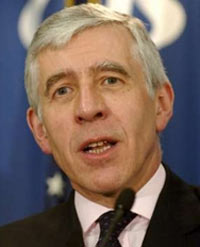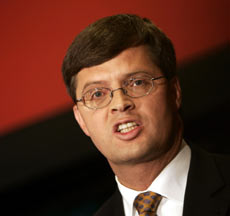|
Dutch Empathic "No" Throws EU Into Disarray
 |
|
"The
verdict of these referendums now raises profound questions for all
of us about the future direction of Europe," Straw said.
(Reuters)
|
BRUSSELS,
June 2, 2005 (IslamOnline.net & News Agencies) – The European
Union (EU) was in disarray Thursday, June 2, after the Dutch
resounding rejection of the bloc's new constitution, dealing a
stunning blow to the EU future expansion and disrupting
decision-making.
"I
can say that the leaders in Brussels are in disarray at the
moment," Mendeltje van Keulen, political analyst at the
Clingendael Institute of international relations near The Hague, was
quoted as saying by Agence France Presse (AFP).
Dutch
voters emphatically rejected Wednesday the EU charter by an
overwhelming 61.6 percent with only 38.4 percent in favor of the text,
with a turnout of 62.8 percent, well above the 39 percent that voted
in last year's European Parliament election.
"To
have such a very, very large turnout after the French vote but also to
have such an overwhelming "No" is really crushing for the
constitutional treaty," Richard Whitman, from the Royal Institute
of International Affairs in London, told AFP.
The
Dutch thumbs-down of the EU text, few days after the French rejection,
could cast doubts on the bloc's plans for further expansion.
"Enlargement
is going to be one of the big casualties of this decision," van
Keulen stressed.
"Romania
and Bulgaria have probably just got in time ... but for Croatia or
Turkey, it's a different story."
Romania
and Bulgaria are likely to join the Union in 2007 as their accession
treaties have already been signed but membership bids by Turkey,
Ukraine and Balkan hopefuls might be disrupted.
French
voters dealt a crushing blow to plans for greater political
integration in Europe, with about 55 percent saying “no” to the EU
constitution.
The
constitution, hammered out during three years of delicate
negotiations, is supposed to give the EU the framework for streamlined
decision-making following the historic enlargement of the bloc last
year to include 10 mostly ex-communist eastern European countries.
It
also aims to boost the international profile of the EU with a
president and a foreign minister.
The
text needs the approval of all members to go into force.
Profound
Questions
 |
|
-"The
voters have given a clear signal that cannot be
misunderstood," Balkenende said. (Reuters)
|
British
Foreign Minister Jack Straw said the rejection by the French and the
Dutch raised "profound questions", AFP said.
The
(British) government, he said, has long backed the constitution as a
"good deal" for Britain and the EU, "but the verdict of
these referendums now raises profound questions for all of us about
the future direction of Europe."
"And
these issues will be the subject of reflection and debate up to and
beyond the meeting of all European leaders ... on June 16-17,"
Straw said in a statement, implying that a British vote might not take
place early next year.
Nine
of the Union's 25 member states have ratified the constitution but
only Spain has done so by referendum. Next cab off Europe's rank is
Luxembourg on July 10.
"I
am ... worried. I know that myself and others are going to have to
campaign for the European cause with a lot of energy," Luxembourg
Prime Minister Jean-Claude Juncker said after Dutch results came in
late Wednesday.
He
maintained he would resign if the text were rejected in his country,
which currently holds the EU's rotating presidency, and a recent poll
shows that support for a "no" has surged to 41 percent, from
24 percent in October.
Causes
Dutch
opposition to the EU charter has been driven by a range of issues,
including deep dislike to the EU expansion, opposition to Turkey's bid
to join the bloc, and concerns Brussels might undermine liberal Dutch
laws on cannabis, same-sex marriages and euthanasia.
It
also appeared that Dutch voters were resentful of the EU major
financial contributions to the EU budget.
"We
pay too much," Dutch Finance Minister Gerrit Zalm told NOS
television, signaling the Dutch will toughen their negotiating stance
as EU leaders prepare to negotiate their budget for the coming years.
The
result is also likely to make it harder for EU leaders to reach a deal
on the long-term EU budget.
The
Netherlands' per capita contribution to the EU's multi-billion euro
budget is the highest of all 25 member nations, despite rising
unemployment and sluggish growth.
The
Dutch referendum is not binding but parliament has promised to follow
the will of the people, provided turnout exceeds 30 percent.
"The
voters have given a clear signal that cannot be misunderstood,"
Dutch Prime Minister Jan Peter Balkenende said after the referendum
results.
"Loss
of sovereignty, the pace of change, our financial contributions,
Europe has to take it into account."
|